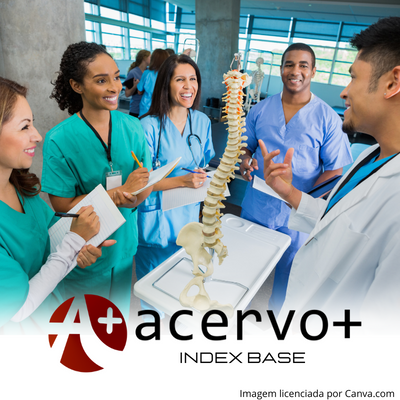Avaliação de habilidades e atitudes no ensino médico com metodologias ativas: estudo bibliométrico
##plugins.themes.bootstrap3.article.main##
Resumo
Objetivo: Realizar um estudo bibliométrico sobre artigos que avaliaram habilidades e atitudes no ensino médico com metodologias ativas. Métodos: Trata-se de um estudo documental bibliométrico. A busca pelos trabalhos foi realizada nos bancos de dados do PubMed, LILACS e BVS no mês de dezembro de 2022. A análise avaliou o perfil dos estudos, as metodologias de ensino utilizadas, as ferramentas utilizadas para avaliação, o método e os desfechos. Resultados: Obteve-se 150 artigos para análise completa, a maior parte desenvolvida nos Estados Unidos, China e Índia, com mediana de participantes de 107. Os principais desfechos avaliados foram a percepção e aprendizado, sendo a principal ferramenta para essa avaliação o uso de questionários. A principal metodologia de ensino foi o aprendizado baseado em equipes (TBL), a ferramenta mais utilizada foram questionários (criados pelos autores), com validação em apenas 15 estudos. A maioria dos estudos foram transversais e quantitativos. Os termos mais utilizados após análise qualitativa dos corpus textual foram “student”, “medical”, “learn”, “teach”, “study” e “active”. Considerações Finais: a avaliação de habilidades e competência no ensino médico ainda é um campo amplo para pesquisas, dada a não uniformidade da avaliação, devendo ser mais explorada pela comunidade científica, principalmente no Brasil
##plugins.themes.bootstrap3.article.details##
Copyright © | Todos os direitos reservados.
A revista detém os direitos autorais exclusivos de publicação deste artigo nos termos da lei 9610/98.
Reprodução parcial
É livre o uso de partes do texto, figuras e questionário do artigo, sendo obrigatória a citação dos autores e revista.
Reprodução total
É expressamente proibida, devendo ser autorizada pela revista.
Referências
2. BOULET JR e DURNING SJ. What we measure and what we should measure in medical education. Medical Education, 2018; 53(1): 86-94.
3. CHALLA KT, et al. Modern techniques of teaching and learning in medical education: a descriptive literature review. Mededpublish, 2021; 10(1): 1-1.
4. COUTO LB, et al. Formative assessment scores in tutorial sessions correlates with OSCE and progress testing scores in a PBL medical curriculum. Medical Education Online, 2019; 24(1): 1-1.
5. DESY JR, et al. Milestones and Millennials: a perfect pairing competency-based medical education and the learning preferences of generation Y. Mayo Clinic Proceedings, 2017; 92(2): 243-250.
6. DINKINS CS e CANGELOSI PR. Putting Socrates back in Socratic method: theory-based debriefing in the nursing classroom. Nursing Philosophy, 2019; 20(2):1-1.
7. ENG S e DHOLAKIA N. Action Research: A Review and Proposal for Application in Marketing Inquiry. The Qualitative Report. 2019; 24(4):754-763.
8. FRENCH H, et al. Perspectives: the flipped classroom in graduate medical education. Neoreviews, 2020; 21(3):150-156.
9. GERA M, et al. Team Based Learning Vs Problem Based Learning in Medical Education: a systematic review. Eastern Journal Of Medical Sciences, 2023; 1-6.
10. HARRIS N e BACON CEW. Developing Cognitive Skills Through Active Learning: a systematic review of health care professions. Athletic Training Education Journal, 2019; 14(2): 135-148.
11. KULKARNI P, et al. Medical education in India: past, present, and future. Apik Journal Of Internal Medicine, 2019; 7(3): 69-75.
12. LAKHTAKIA R, et al. Assessment as Learning in Medical Education: feasibility and perceived impact of student-generated formative assessments. Jmir Medical Education, 2022; 8(3): 1-14.
13. LEE GB e CHIU AM. Assessment and feedback methods in competency-based medical education. Annals Of Allergy, Asthma & Immunology, 2022; 128(3): 256-262.
14. LOPES JM, et al. Self-Efficacy of Medical Students in Two Schools with Different Education Methodologies (Problem-Basead Learning versus Traditional). Rev Bras de Edu Méd, 2020; 44(2): 1-1.
15. MEIRELES MAC, et al. Novas Diretrizes Curriculares Nacionais e a Formação Médica: expectativas dos discentes do primeiro ano do curso de medicina de uma instituição de ensino superior. Revista Brasileira de Educação Médica, 2019; 43(2):67-78.
16. POZZO MI, et al. Using questionnaires in research on universities: analysis of experiences from a situated perspective. Revista d’Innovacio i Recerca en Educacio, 2019; 12(2).
17. SAHU P. Closure of Universities Due to Coronavirus Disease 2019 (COVID-19): impact on education and mental health of students and academic staff. Cureus, 2020; 1-1.
18. SANCHEZ‐LARA PA, et al. Thinking outside “The Box”: case-based didactics for medical education and the instructional legacy of Dr John M. Graham, Jr. American Journal Of Medical Genetics Part A, 2021;185(9): 2636-2645.
19. SON HT, et al. Measuring Students’ satisfaction with higher education service - An experimental study at Thainguyen University. International Journal of Business Marketing and Management, 2018; 3(4): 21-34.
20. THANGARAJ P. Concept of Formative assessment and Strategies for its effective implementation under Competency-Based Medical Education: A Review. National J of Res in Comm Med, 2021; 10(1): 16-24.
21. TRULLÀS JC, et al. Efectiveness of problem-based learning methodology in undergraduate medical education: a scoping review. Bmc Medical Education, 2022; 22(1):1-12.
22. WANG W. Medical education in China: progress in the past 70 years and a vision for the future. Bmc Medical Education, 2021; 21(1): 1-1.
23. WITHERIDGE A, et al. Revisiting Miller’s pyramid in medical education: the gap between traditional assessment and diagnostic reasoning. International Journal Of Medical Education, 2019; 10: 191-192.
24. ZANGIROLAMI-RAIMUNDO J, et al. Research methodology topics: cross-sectional studies. Journal Of Human Growth And Development, 2018; 28(3): 356-360.

